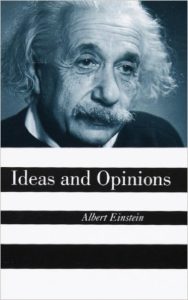In Praise of the Tamed Metaphysicist: Einstein on Reality, Rationality, and the Human Passion for Comprehension
SCIENCE - SPIRITUALITY, 16 May 2016
Maria Popova | Brain Pickings – TRANSCEND Media Service
“There exists a passion for comprehension, just as there exists a passion for music. That passion is rather common  in children, but gets lost in most people later on.”
in children, but gets lost in most people later on.”
“Reason is a tool, a machine, which is driven by the spiritual fire,” Dostoyevsky wrote in 1838 as he contemplated how we come to know truth.
More than a century later, Albert Einstein (March 14, 1879–April 18, 1955) examined the nature of the spiritual fire that fuels reason, which he called “a passion for comprehension,” in a 1950 Scientific American essay later included in Ideas and Opinions (public library) — that superb compendium that gave us Einstein’s abiding reflections on the value of kindness, the secret to his thought process, the common language of science, and his increasingly timely message to posterity.
Einstein, who first contacted that “passion for comprehension” in his formative experience with a compass, writes:
There exists a passion for comprehension, just as there exists a passion for music. That passion is rather common in children, but gets lost in most people later on. Without this passion, there would be neither mathematics nor natural science. Time and again the passion for understanding has led to the illusion that man is able to comprehend the objective world rationally, by pure thought, without any empirical foundations — in short, by metaphysics. I believe that every true theorist is a kind of tamed metaphysicist, no matter how pure a “positivist” he may fancy himself. The metaphysicist believes that the logically simple is also the real. The tamed metaphysicist believes that not all that is logically simple is embodied in experienced reality, but that the totality of all sensory experience can be “comprehended” on the basis of a conceptual system built on premises of great simplicity. The skeptic will say that this is a “miracle creed.” Admittedly so, but it is a miracle creed which has been borne out to an amazing extent by the development of science.
Complement the indispensable Ideas and Opinions with Einstein on science and religion, the secret to learning anything, growing old, his breathtaking love letters, and his magnificent letter of advice to Marie Curie on how to handle haters.
________________________________
Brain Pickings is the brain child of Maria Popova, an interestingness hunter-gatherer and curious mind at large obsessed with combinatorial creativity who also writes for Wired UK and The Atlantic, among others, and is an MIT Futures of Entertainment Fellow. She has gotten occasional help from a handful of guest contributors.
Go to Original – brainpickings.org
DISCLAIMER: The statements, views and opinions expressed in pieces republished here are solely those of the authors and do not necessarily represent those of TMS. In accordance with title 17 U.S.C. section 107, this material is distributed without profit to those who have expressed a prior interest in receiving the included information for research and educational purposes. TMS has no affiliation whatsoever with the originator of this article nor is TMS endorsed or sponsored by the originator. “GO TO ORIGINAL” links are provided as a convenience to our readers and allow for verification of authenticity. However, as originating pages are often updated by their originating host sites, the versions posted may not match the versions our readers view when clicking the “GO TO ORIGINAL” links. This site contains copyrighted material the use of which has not always been specifically authorized by the copyright owner. We are making such material available in our efforts to advance understanding of environmental, political, human rights, economic, democracy, scientific, and social justice issues, etc. We believe this constitutes a ‘fair use’ of any such copyrighted material as provided for in section 107 of the US Copyright Law. In accordance with Title 17 U.S.C. Section 107, the material on this site is distributed without profit to those who have expressed a prior interest in receiving the included information for research and educational purposes. For more information go to: http://www.law.cornell.edu/uscode/17/107.shtml. If you wish to use copyrighted material from this site for purposes of your own that go beyond ‘fair use’, you must obtain permission from the copyright owner.
Read more
Click here to go to the current weekly digest or pick another article:
SCIENCE - SPIRITUALITY:
